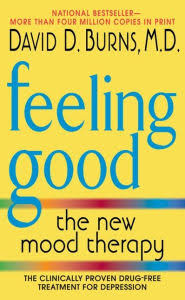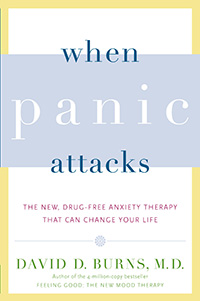Dec 16, 2019
Today, Rhonda rejoins us as host after a three week hiatus! My neighbor, Dave Fribush, joins us as well, as we answer two thought-provoking questions!
- Is it possible to treat “burnout?”
- Can negative feelings can make physical pain worse?
1. Does "burnout" exist? How do you treat it?
Comment: Hi!
I have been listening to your podcast for a while now and it has helped, and has encouraged me and made me feel less alone. Thank for your work and sharing your podcast with us!
My situation now is very much defined by my burnout syndrome (a medical diagnosis in Sweden, not sure about the US) and/or depression. From what I’ve learnt there is no evidence of CBT as a treatment for burnout - really nothing other than adaptations at your workplace. What triggered me to ”hit the wall” was studying too hard and not giving my body and mind time to recover.
Do you have any thoughts on burnout and effective treatment of it? I feel I have made huge progress in the underlying reasons to my burnout like perfectionism, performance-based self-esteem, figuring out how I want my life to be, who I am etc (although the last one is a big one!). All this with the help of CBT and other sorts of therapy. What remains is mental fatigue, on and off anxiety, not being able to focus and hardly any mental or emotional resilience.
Through healthcare, you are basically treated for depression, the treatment being anti-depressants. I’ve been on sick leave full time for over four years now, am in my late twenties and am constantly frustrated, sad and feeling stuck. I want to get going towards this life I now know that I want but I don’t seem to get any better. I eat and sleep well and exercise. I realize this could be a complete medical question but nobody REALLY seems to know anything about burnout. A long question but hey ho :) Would be grateful for any thoughts you might have, thanks again!
Sincerely,
Elisabeth
Hi Elisabeth,
I’m sorry to hear that you’ve been struggling for some time, but I'm glad you've been making progress, and I'm so glad you wrote to me.
To my way of thinking, there is really no such “thing” as burnout. Depression, anxiety, anger, and other negative feelings do exist. Burnout is just a vague buzzword for feeling upset when something upsetting has happened.
When I was in clinical practice, I saw as many as 17 depressed and anxious patients in one day, and as the day went on, I just got higher and higher and more energetic. That's because I loved what I was doing and felt I had something to offer, a lot, actually. I only got "burned out," or unhappy, if I felt I had said something that hurt someone's feelings, or if I had not done a good job for someone. Then I got really upset, but it was my thoughts, and not what I was doing, that caused my feelings. That, of course, is the cognitive model.
I found it helpful to zero in on one moment when I was feeling depressed, anxious, or “burned out,” and to do a Daily Mood Log focusing on that moment. I’ll attach one to this email in case you are interested. I’ve also included a completed one so you can see how it works. This is not a similar case, just something I grabbed by way of illustration.
Thanks,
David (a fellow Swede)
On the show, I describe one of the most stressful experiences of my career, when I appeared on a Philadelphia TV show with Maury Povich, and a patient of mine threatened to commit suicide. Fortunately, the story had a surprise ending that was very positive.
So my message is one of hope. The idea is to focus on some specific thing you are upset about, as opposed to getting overly focused on a concept like "burnout."
I think we all feel pretty exhausted at times, and if you've been studying or working too hard, it definitely makes sense to take a break to take care of yourself. When I transferred from my residency training program at Highland Hospital in Oakland, California, to the residency program at the University of Pennsylvania, in Philadelphia, one of my supervisors gave me this advice--he told me to make sure I set aside at least one half a day a week to stare at walls.
What he meant was that I was working intensely, 24/7, during the first two years of my residency, and he wanted to make sure I gave myself a break to rest from time to time. So every Sunday afternoon I just watched football games on TV, often with a cat on my lap. This was refreshing and helpful, and my supervisor's advice helped me avoid feeling guilty for not working 24/7!
2. More on physical pain. Is it really true that negative feelings can make physical pain worse?
We recently did a podcast with Dr. David Hanscom, a back surgeon who emphasized non-surgical treatments for back pain that can be surprisingly helpful. In that podcast, I described my research indicating that 50% of the pain we experience can the result of negative feelings, such as depression, anxiety, and anger. And if you can reduce or eliminate those negative feelings, your physical pain will often diminish substantially, and may even disappear entirely.
I first discovered this amazing phenomenon when I had a dramatic and traumatic personal experience as a medical student. One night I was drinking beer at a bar in Palo Alto, and hurt a commotion, and turned to look. A fight had broken out, and although I was not involved in the fight, I saw a beer mug flying in slow motion toward my face. It hit my jaw, and glass exploded everywhere, and blood came gushing out of my mouth. I realized that my jaw was broken, and my front teeth were loose as well, so I ran outside to my old VW Beetle and drove at high speed to the emergency room of the Stanford Hospital. I ran inside and announced that I was a medical student and my jaw was broken.
They put me on a gurney, and ordered an x-ray. I was in intense pain, and I was scared and angry, and still intoxicated, and probably wasn't the most cooperative patient.
Eventually, a plastic surgeon was consulted and he talked to me after reviewing the X-ray. He explained that I had a broken jaw, and that he was going to hospital me and do surgery in the morning. He said my jaw would be wired shut for six weeks.
I asked if I was going to lose my front teeth that were loose. He said he didn't think so, but that I would have a dental consult to check things out after they removed the wires on my jaw in six weeks. Then he said that he knew I was in severe pain, and that he'd ordered pain shots for me during the night. He said he wanted me to be comfortable, and explained that he wanted me to request a pain shot any time I was in pain during the night. Then he put his hand on my shoulder and said, "This is very routine, and you're going to be fine."
At that very moment, my pain instantly went from severe to zero, and I did not need a single pain shot all night long.
Dave Fribush emphasizes that while the surgeon's warmth and compassion were helpful, the thing that made my pain suddenly disappear was the sudden disappearance of my negative feelings--intense anxiety about losing my teeth, as well as anger at feeling that I was being neglected. And the very moment my negative feelings changed, my anger disappeared as well.
My later research confirmed that negative emotions can, in fact, magnify the experience of physical pain, and that, on average, 50% of the pain we experience results from our negative emotions. This finding should provide hope for individuals struggling with physical pain, especially since this is a drug-free treatment not involving opiates.
if you want to reduce your negative feelings, one approach would be to read one of my books, like Feeling Good or When Panic Attacks.

They are, of course, not guaranteed to cure you, but research confirms that many people who read them do develop a more positive outlook on life and experience significant reductions in depression and anxiety. And the can be obtain inexpensively at Amazon or other book sellers.

Next week, David, Rhonda and Dave will discuss three more questions you have submitted:
- Does emotional trauma cause brain damage?
- Do you have to have a good cry when something traumatic happens?
- Why does avoidance make anxiety worse?
David & Rhonda